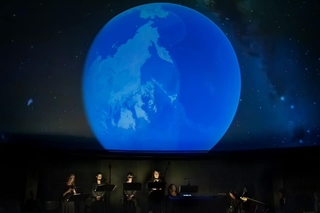
The environmental crisis cannot easily be disentangled from the religious perspectives on the meaning and value of the natural world. One way to understand these perspectives is through the lens of cosmology, a term that encompasses interrelationships between humans, other-than-humans, ecological systems and even the universe or cosmos itself. The cosmological knowledge found across religious traditions shapes human relationships with the more-than-human world and orients religious and environmental action. Stories of cosmic creation, for example, link sacred histories with ritual and worship practices and contemporary social and environmental action. In this way, sacred cosmologies offer an epistemological ground that orients humans in their local and global ecosystems today.
Expressive culture provides an essential link between religious cosmologies and contemporary life. We invite projects that explore the links between religious cosmologies, expressive cultures, and contemporary environmental action. How does expressive culture employ cosmological knowledge for the sake of environmental action? How can expressive culture teach us to more fully recognize the value and agency of the more-than-human world often assumed by sacred cosmologies? Can engagement with and participation in expressive cultures motivate and transform individuals, communities and even polities to pursue more just and sustainable futures? Can expressive cultures bridge the divide between different religious cosmologies to enable the pursuit of a future of shared social and environmental flourishing?
Further lines of inquiry arise from the recognition that sacred cosmologies are not static. They evolve and adapt to contemporary needs and to changing scientific knowledge. Expressive culture is a key site in which sacred cosmologies are taken up, reinterpreted, and transformed. Expressive culture generates new narratives and new interpretations of old narratives. It reimagines how human lives and communities can and should live by sacred cosmologies. We invite projects considering how sacred cosmologies are adapted and generated in light of current ecological realities. How are environmental crises generating new expressive cultures and new interpretations of sacred cosmologies? Can our scientific cosmology, in and through expressive culture, orient human relationships with the world?